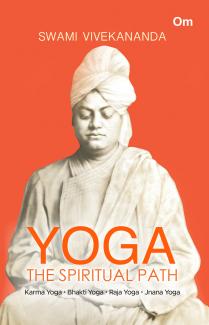Yoga: The Spiritual Path
Swami Vivekananda (12 January 1863 – 4 July 1902), born Narendranath Datta, was an Indian Hindu monk, philosopher, author, religious teacher, and the chief disciple of the Indian mystic Ramakrishna. He was a key figure in the introduction of Vedanta and Yoga to the Western world and is credited with raising interfaith awareness, and bringing Hinduism to the status of a major world religion. Vivekananda became a popular figure after the 1893 Parliament of Religions in Chicago, where he began his famous speech with the words, "Sisters and brothers of America...," before introducing Hinduism to Americans.He was so impactful at the Parliament that an American newspaper described him as "an orator by divine right and undoubtedly the greatest figure at the Parliament". After great success at the Parliament, in the subsequent years, Vivekananda delivered hundreds of lectures across the United States, England and Europe, disseminating the core tenets of Hindu philosophy, and founded the Vedanta Society of New York and the Vedanta Society of San Francisco (now Vedanta Society of Northern California), both of which became the foundations for Vedanta Societies in the West. Born into an aristocratic Bengali Kayastha family in Calcutta, Vivekananda was inclined from a young age towards religion and spirituality. He later found his guru, Ramakrishna, and became a monk. After the death of Ramakrishna, Vivekananda extensively toured the Indian subcontinent, acquiring first-hand knowledge of the living conditions of Indian people in then British India. Moved by their plight, he resolved to help his countrymen, and found a way to travel to the United States where he was highly successful. In India, Vivekananda founded the Ramakrishna Math, which provides spiritual training for monastics and householder devotees, and the Ramakrishna Mission, to provide charity, social work and education. Vivekananda was also a major force in contemporary Hindu reform movements, and contributed to the concept of nationalism in colonial India. He is regarded as a patriotic saint, and his birthday in India is celebrated as National Youth Day. ... Read more Read less
“Our main problem is to be free. It is evident then that until we realise ourselves as the Absolute, we cannot attain deliverance. Yet there are various ways of attaining this realisation.These methods have the generic name ofYoga (to join,to join ourselves to our reality).These Yogas, though divided into various groups, can principally be classed into four [KarmaYoga,BhaktiYoga,RajaYoga and JnanaYoga],and as each is only a method leading indirectly to the realisation of the Absolute, they are suited to different temperaments. Now it must be remembered that it is not that the assumed man becomes the real man or Absolute.There is no becoming with the Absolute. It is ever free, ever perfect, but the ignorance that has covered Its nature for a time is to be removed. Therefore,the whole scope of all systems ofYoga (and each religion represents one) is to clear up this ignorance and allow the Atman to restore its own nature.” Swami Vivekananda combines theYogas of the Bhagavad Gita and Patanjali’s Yoga Sutras, with the wisdom of India’s rich philosophical tradition in Yoga: The Spiritual Path, a definitive guide to self-realisation. ... Read more Read less











